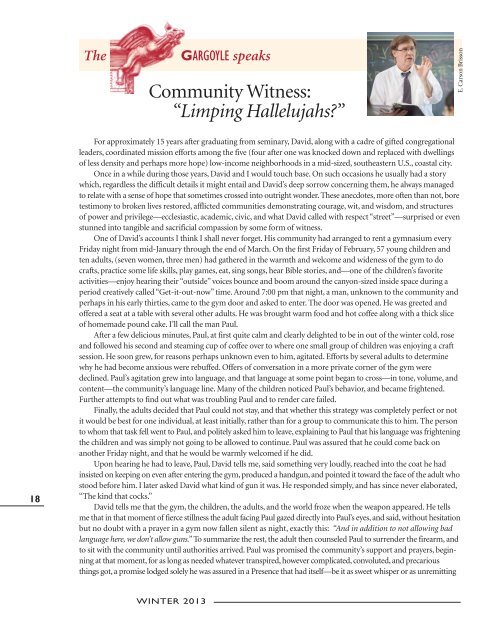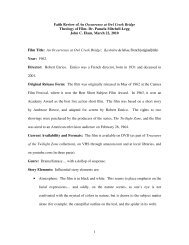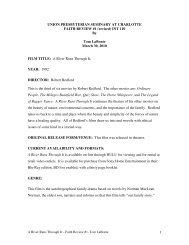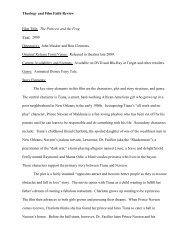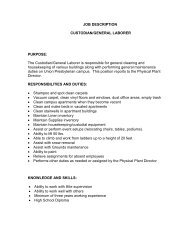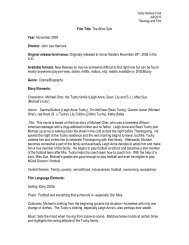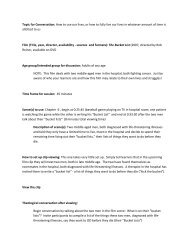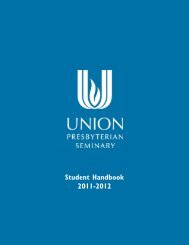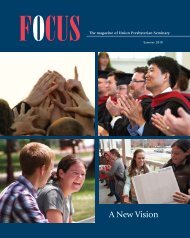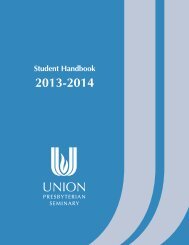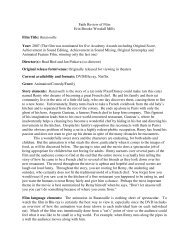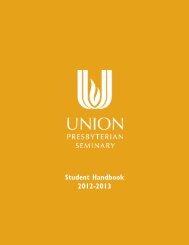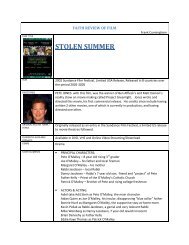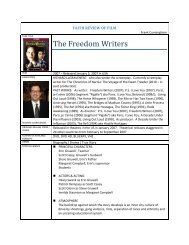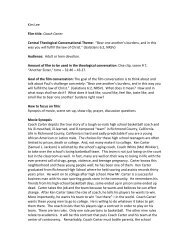FOCUS Winter 2012:FOCUS Spring 04 - Union Presbyterian Seminary
FOCUS Winter 2012:FOCUS Spring 04 - Union Presbyterian Seminary
FOCUS Winter 2012:FOCUS Spring 04 - Union Presbyterian Seminary
You also want an ePaper? Increase the reach of your titles
YUMPU automatically turns print PDFs into web optimized ePapers that Google loves.
The<br />
GARGOYLE speaks<br />
Community Witness:<br />
“Limping Hallelujahs?”<br />
E. Carson Brisson<br />
18<br />
For approximately 15 years after graduating from seminary, David, along with a cadre of gifted congregational<br />
leaders, coordinated mission efforts among the five (four after one was knocked down and replaced with dwellings<br />
of less density and perhaps more hope) low-income neighborhoods in a mid-sized, southeastern U.S., coastal city.<br />
Once in a while during those years, David and I would touch base. On such occasions he usually had a story<br />
which, regardless the difficult details it might entail and David’s deep sorrow concerning them, he always managed<br />
to relate with a sense of hope that sometimes crossed into outright wonder. These anecdotes, more often than not, bore<br />
testimony to broken lives restored, afflicted communities demonstrating courage, wit, and wisdom, and structures<br />
of power and privilege—ecclesiastic, academic, civic, and what David called with respect “street”—surprised or even<br />
stunned into tangible and sacrificial compassion by some form of witness.<br />
One of David’s accounts I think I shall never forget. His community had arranged to rent a gymnasium every<br />
Friday night from mid-January through the end of March. On the first Friday of February, 57 young children and<br />
ten adults, (seven women, three men) had gathered in the warmth and welcome and wideness of the gym to do<br />
crafts, practice some life skills, play games, eat, sing songs, hear Bible stories, and—one of the children’s favorite<br />
activities—enjoy hearing their “outside” voices bounce and boom around the canyon-sized inside space during a<br />
period creatively called “Get-it-out-now” time. Around 7:00 pm that night, a man, unknown to the community and<br />
perhaps in his early thirties, came to the gym door and asked to enter. The door was opened. He was greeted and<br />
offered a seat at a table with several other adults. He was brought warm food and hot coffee along with a thick slice<br />
of homemade pound cake. I’ll call the man Paul.<br />
After a few delicious minutes, Paul, at first quite calm and clearly delighted to be in out of the winter cold, rose<br />
and followed his second and steaming cup of coffee over to where one small group of children was enjoying a craft<br />
session. He soon grew, for reasons perhaps unknown even to him, agitated. Efforts by several adults to determine<br />
why he had become anxious were rebuffed. Offers of conversation in a more private corner of the gym were<br />
declined. Paul’s agitation grew into language, and that language at some point began to cross—in tone, volume, and<br />
content—the community’s language line. Many of the children noticed Paul’s behavior, and became frightened.<br />
Further attempts to find out what was troubling Paul and to render care failed.<br />
Finally, the adults decided that Paul could not stay, and that whether this strategy was completely perfect or not<br />
it would be best for one individual, at least initially, rather than for a group to communicate this to him. The person<br />
to whom that task fell went to Paul, and politely asked him to leave, explaining to Paul that his language was frightening<br />
the children and was simply not going to be allowed to continue. Paul was assured that he could come back on<br />
another Friday night, and that he would be warmly welcomed if he did.<br />
Upon hearing he had to leave, Paul, David tells me, said something very loudly, reached into the coat he had<br />
insisted on keeping on even after entering the gym, produced a handgun, and pointed it toward the face of the adult who<br />
stood before him. I later asked David what kind of gun it was. He responded simply, and has since never elaborated,<br />
“The kind that cocks.”<br />
David tells me that the gym, the children, the adults, and the world froze when the weapon appeared. He tells<br />
me that in that moment of fierce stillness the adult facing Paul gazed directly into Paul’s eyes, and said, without hesitation<br />
but no doubt with a prayer in a gym now fallen silent as night, exactly this: “And in addition to not allowing bad<br />
language here, we don’t allow guns.” To summarize the rest, the adult then counseled Paul to surrender the firearm, and<br />
to sit with the community until authorities arrived. Paul was promised the community’s support and prayers, beginning<br />
at that moment, for as long as needed whatever transpired, however complicated, convoluted, and precarious<br />
things got, a promise lodged solely he was assured in a Presence that had itself—be it as sweet whisper or as unremitting<br />
WINTER 2013


